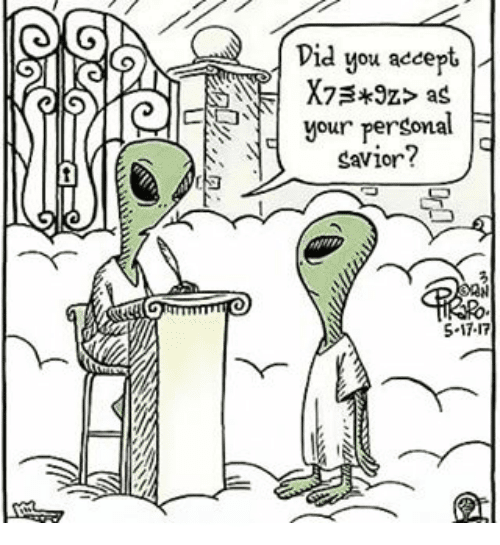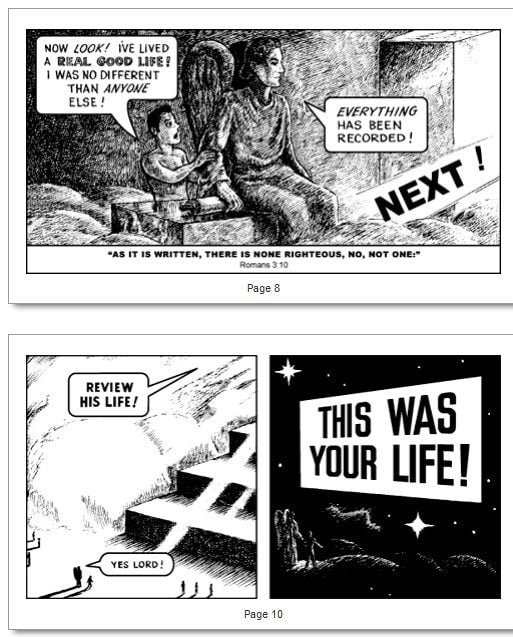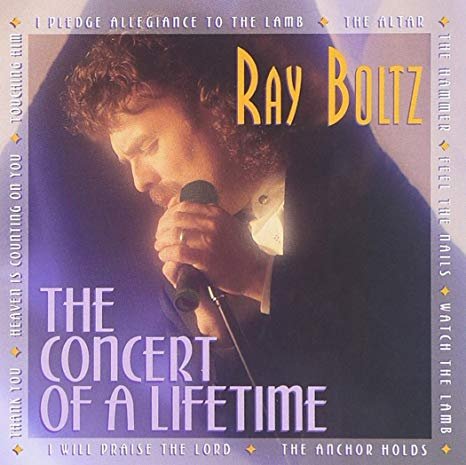
Fifty-three years ago in September, I made a public profession of faith at Trinity Baptist Church in Findlay, Ohio. This simple, brief, heartfelt decision became the foundation of my life for the next thirty-five years. According to my pastors, and later my professors, once an unsaved sinner gets saved, they can never, ever lose their salvation. I remember R.B. Thieme saying that once a person is saved, they can blaspheme God and deny that Jesus saved him without affecting his salvation. In other words, once you sincerely pray the sinner’s prayer, you are f-o-r-e-v-e-r saved. Nothing you do afterward can separate you from the love of God and his grace. And I mean nothing. Sure, Christians can backslide and find themselves out of the will of God, but this does not affect the state of their salvation. Once saved, always saved. If what we do affects our eternal destiny, that means we are saved by works, and not faith. Or so many Evangelical preachers say, anyway.
While the Bible certainly can be used to justify these beliefs, the Bible can also be used to show that Christians can and do lose their salvation and end up in Hell. Further, the Bible also teaches that once a person loses their salvation, they can never, ever be saved again. For Christians who believe you can lose your salvation, works are essential to saving faith.
Which soteriological position is right? They all are. Every Christian sect, preacher, and church member uses the Bible to justify and prove their beliefs. How can we possibly know which view is right? I think the best way to determine who is right is to put representatives of each position in an octagon ring and let them fight it out. The last soteriology standing is right, or, at the very least, less wrong than the other ones. You would think God would be clearer on such an important subject, but alas, God cares more about his golf score or finding Grandma’s keys for her, that he doesn’t have time to settle the terms of salvation.
Yesterday, I stumbled across an article titled, Will a Christian-Turned-Atheist Go to Hell? Lucas Kitchen wrote (all grammar and punctuation in the original):
Let me set up this discussion with a hypothetical scenario.
Have you ever heard preachers say, “If a person doesn’t obey the Bible, they may not be saved, even if they claim to have faith.”
But then at a funeral, the same preacher may say, “The deceased person was saved because they claimed to have faith, even though they didn’t obey the Bible.”I noticed this inconsistency when I was in high school when one of my close friends passed away.
So which is it? Do we have to obey the Bible until we die to be saved, or is it enough to have faith?
Well, I’m confident that the Bible teaches that once someone is made alive in Christ, born again, and becomes a believer, they have eternal life that can never be lost or returned.
That means a Christian who becomes an atheist will still have eternal life. They are still saved even if they fall into unbelief and disobedience.
Now, I know many of you that might be a new idea. However, it’s not an idea I invented, but instead a concept that the Bible teaches quite consistently. So I thought I would take a minute to answer a few obvious questions that the video raises.
Some opponents of this idea will say that a “true” believer will never stop believing.
But the Bible doesn’t distinguish between “true” belief and belief.
Secondly, the Bible speaks of saved people who stopped believing for a time.
….
If eternal life is given when one first believes, then obedience is not required for salvation. If receiving eternal life required a life of obedience then Jesus could only give eternal life at the end of someone’s life when they proved that they could be obedient. But that’s not what the Bible tells us.
It sounds good on the surface, but there are a few of problems with this claim. It is true that Someone’s belief in Christ can blossom into good works. In fact, that’s what we hope happens with all Christians. We hope that they add good works to their faith. We hope that they not only believe but obey Christ. So if someone is doing good works in obeying Christ it’s likely they are doing that because they have believed in him. We have to be careful here though, we can’t use good works as proof that someone has believed since it’s possible for a believer to disobey Christ. We find that in second Timothy two, first Corinthian‘s three, and a number of other places.
There is another problem with this concept still. We can’t use obedience to Christ as proof of faith since Current actions are most likely based on current beliefs. Therefore, current inaction can only be based on current disbelief but is not necessarily based previous disbelief.
You can’t prove that someone never believed in the past by how they act in the present. There was a time when I believed it was ok to drink only coca-cola all the time. I acted on that belief while I still believed it. However, I no longer drink Coke all the time. Can you infer from my current actions what I used to believe? Obviously not. The only thing that you might be able to make a guess on is what I currently believe that I shouldn’t drink Coca-Cola. Even then, I could be acting against what I believe. The point is, trying to use obedience to Christ as proof of faith is a flawed method.
Eternal life is not given after a life of belief, but at the first moment, one believes.
Therefore, present disobedience cannot demonstrate a lack of belief in the past.
….
The bottom line is if you believe in Jesus for eternal life you have it. No matter what happens after that point you still have it.
An atheist’s current unbelief doesn’t negate salvation received earlier in life.
A believer’s future unbelief or misbehavior can’t dissolve, destroy, or derail their deliverance from Hell.
Even if the Christian strays that can’t sabotage, subdue, or stop salvation.
So there ya have it, outspoken atheist and denier of the central claims of Christianity Bruce Gerencser is still a Christian! According to Kitchen, because I made a profession of faith fifty-three years ago, there’s literally NOTHING I can do to lose my salvation. And I mean nothing! According to Kitchens, I can’t sabotage, subdue, or stop my salvation! Take the men who frequent the pages of the Black Collar Crime Series, Vile, corrupt men the lot of them, but have you noticed that many of them end up back in the ministry after being punished for their crimes? How is this possible? Simple, 1 John 1:9:
If we confess our sins, he who is faithful and just will forgive us our sins and cleanse us from all unrighteousness. (1 John 1:9 NRSV)
This means that forgiveness is but a prayer of forgiveness away, and since the Bible says in Romans 11:29: For the gifts and the calling of God are irrevocable, not only is a pervert’s salvation irrevocable, so is his calling. And it is for these reasons that David Hyles — an IFB preacher with a long track record of immorality and crimes — is still a preacher, and people continue supporting him.
Romans 8:31:35, 38-39 says:
What then are we to say about these things? If God is for us, who is against us? He who did not withhold his own Son but gave him up for all of us, how will he not with him also give us everything else? Who will bring any charge against God’s elect? It is God who justifies. Who is to condemn? It is Christ who died, or rather, who was raised, who is also at the right hand of God, who also intercedes for us. Who will separate us from the love of Christ?
….
For I am convinced that neither death, nor life, nor angels, nor rulers, nor things present, nor things to come, nor powers, nor height, nor depth, nor anything else in all creation will be able to separate us from the love of God in Christ Jesus our Lord.
The Apostle Paul was clear: NOTHING can separate us [Christians] from the love of God in Christ Jesus our Lord.
I wasn’t in the ministry long before I realized how bankrupt this kind of thinking really was. Guaranteed salvation gives men like Dr. David Tee (whose real name is Derrick Thomas Thiessen), Revival Fires, John, and countless other Christians the freedom to live as they wish without fear of losing their salvation. Nothing they say or do can separate them from the love of Jesus. In those rare moments when they genuinely feel sorry for what they do, all they have to do is to sincerely repent, and God will wipe their slate clean. Awesome, right?
As a pastor, I concluded that, as James did, “faith without works is dead; that we show our faith by our works.” Think of all the Evangelical miscreants, including those mentioned above, who comment on this site, send me emails, and write blog posts about me and the readers of this site. What do their words say about their Christianity? Everything. Don’t tell me what you believe, show me. By the late 1980s, my preaching had a Calvinistic bent. No longer did I preach the truncated, bastardized gospel of my IFB upbringing and training. Sure, IFB preachers could prove their beliefs from the Bible, but so could I. I determined that a faith+works salvation best reflected the teachings of Jesus. This, of course, led to me being accused of preaching “works salvation.” Better than no-works salvation, I thought at the time.
To this day, I think there should be a connection between beliefs and how a person lives. As an agnostic atheist and humanist, I try every day to live according to the ideals reflected in the various humanist manifestos. And when I fail, what do I do? I do my best to make things right, and, if necessary, make restitution. Unlike the Evangelical Christian, who prays to God when atoning for sin, I make things right with those I’ve offended. No God needed.
Am I still a Christian? According to Kitchens, I am. And nothing I do can change this eternal fact. Once saved, always saved. After I post this, I think I will get drunk, snort some drugs, and go pick up two prostitutes for a wild roll in the hay. I am sure I will feel guilty afterward, so all I have to do is ask the God who doesn’t exist to wipe my slate clean. I can do this day after day, and God will still forgive me. What’s not to like about his form of Christianity, right?
To the thousands of heathens who read this blog, I encourage you to stop what you are doing and pray the sinner’s prayer, asking Jesus to cleanse you from your sin. No need to cross your fingers. No matter what you do, and that includes murder, rape, incest, and rooting for the Cubs, the triune God of the Bible will forgive you and cleanse you from all unrighteousness. That’s why Paul had to field the question, “Should I sin more, so the grace of God may abound?” While Paul said, “God forbid,” the Bible says differently. Sin away, Christians, God’s forgiveness is but a mumbled prayer away.
I am sure this belief sounds absurd to many of you, and I agree. I am no more a Christian than Satan himself. There’s nothing in my life that remotely suggests I am a Christian (other than I live a better life than many Christians I know). Scores of people who read this blog are former Evangelical Christians. This means they are still s-a-v-e-d! Maybe we should start an online church, First Church of Saved Atheists or First Church of Hitchens. As long as we had a momentary born-again experience, we will go to Heaven when we die. Though, when I think about it, do I really want to spend eternity praising the name of a narcissistic God? Hell is starting to sound more appealing to me. But I can’t go to Hell even if I wanted to. Once saved, always saved. I am powerless to divorce Jesus. We are forever married, regardless of what I say or do.
Bruce Gerencser, 68, lives in rural Northwest Ohio with his wife of 47 years. He and his wife have six grown children and sixteen grandchildren. Bruce pastored Evangelical churches for twenty-five years in Ohio, Texas, and Michigan. Bruce left the ministry in 2005, and in 2008 he left Christianity. Bruce is now a humanist and an atheist.
Your comments are welcome and appreciated. All first-time comments are moderated. Please read the commenting rules before commenting.
You can email Bruce via the Contact Form.










